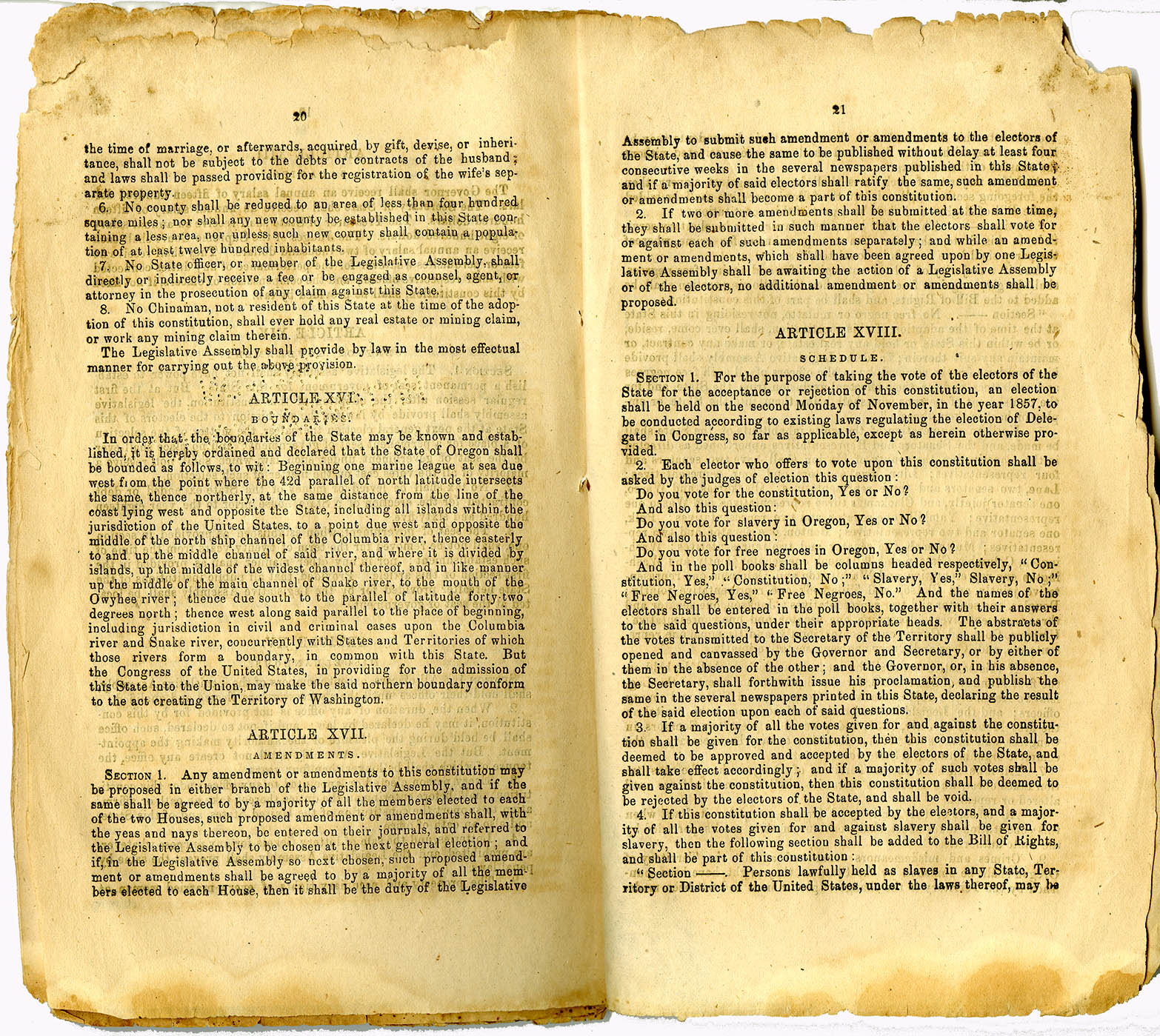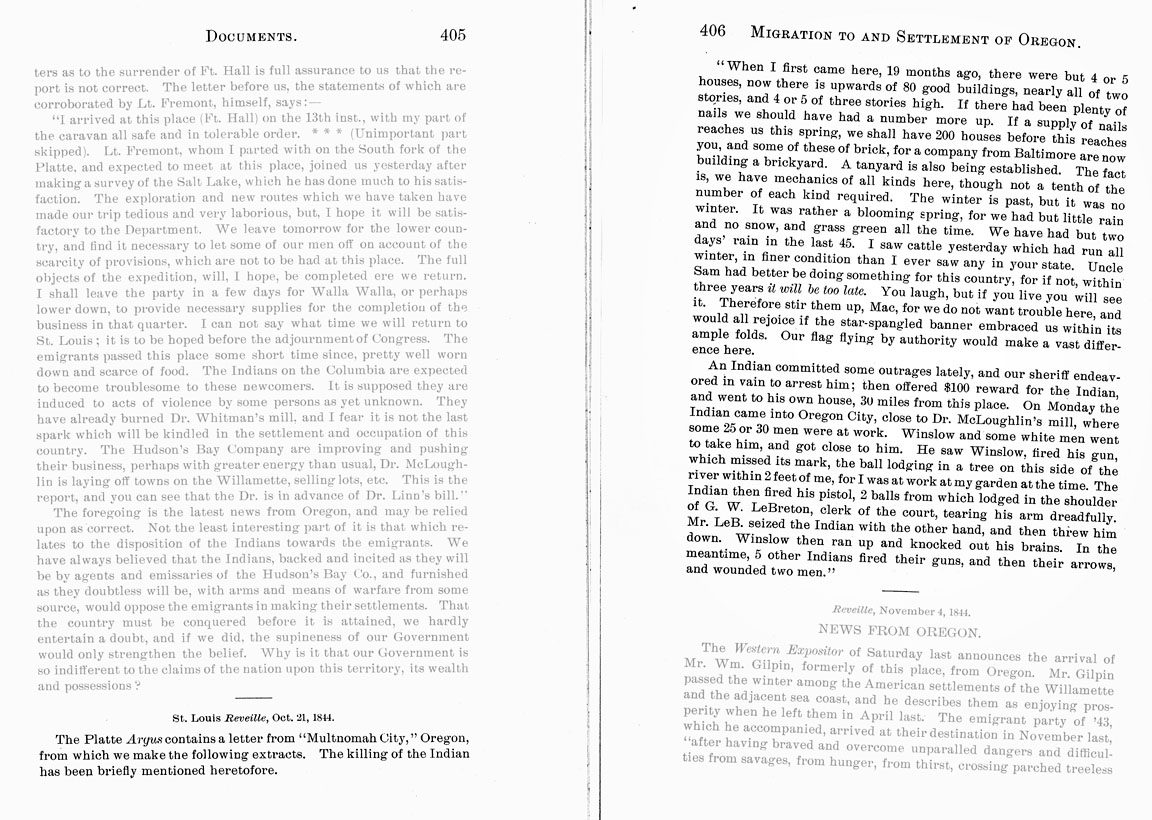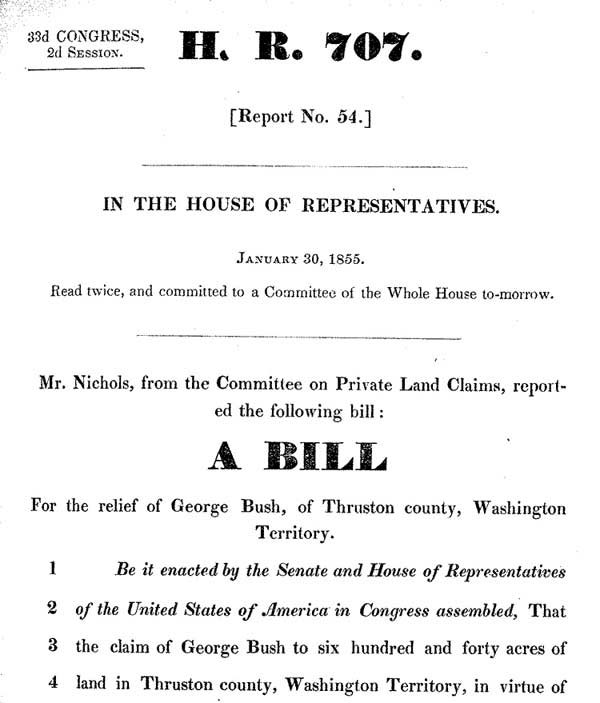| |
| META TOPICPARENT | name="WebPreferences" |
|---|
No Suffrage, Little Attention; Nonetheless, Some Prosperity

| |
<
< | A wealthy half-Black war veteran and frontiersman named George Washington Bush altered the course of history in the Pacific Northwest. Bush was among the first Oregon Trail settlers in present-day Washington. Racism persisted north of the Columbia River, yet policies in Washington Territory were more conducive to Black prosperity than contemporaneous laws in Oregon Territory. Between 1844–1870, small Black enclaves established livelihoods in hardscrabble Washington Territory. The Bush family became prominent. In comparison, Oregon Territory enforced two “Black Exclusion” laws, and its constitution codified abject White supremacy. | >
> | A wealthy half-Black war veteran and frontiersman named George Washington Bush altered the course of history in the Pacific Northwest. Bush was among the first Oregon Trail settlers in present-day Washington. Racism persisted north of the Columbia River, yet policies in Washington Territory were more conducive to Black prosperity than contemporaneous laws in Oregon Territory. Between 1844–1870, small Black enclaves established livelihoods in hardscrabble Washington Territory. The Bush family became prominent. In comparison, Oregon Territory enforced two “Black Exclusion” laws, and its constitution codified abject White supremacy.

Notes
:
:
:
:
| | | Given that Washington Territory’s legislature demonstrated greater interracial tolerance compared to its southern neighbors, did any Black men vote in Washington? | |
<
< | No.
Notes
:
| >
> | No.
Notes
:
| | | | |
<
< | My research concludes that no Black man appeared on a Washington Territory voter roll until after states ratified the Fifteenth Amendment. | >
> | My research concludes that no Black man appeared on a Washington Territory voter roll before states ratified the Fifteenth Amendment in 1870. | | | | |
<
< | Nonetheless, by 1870, over two hundred free Blacks and “mulattoes,” mostly single men, acquired land or earned a living in Washington Territory. Before his death in 1863, Bush became prominent for business, charity and civics. His son, William, served in the state’s first legislature in 1889, and William introduced a successful civil rights bill in 1890. Bush was instrumental in early Washington's growth—but he never voted.
Notes
:
| >
> | Nonetheless, by 1870, over two hundred free Blacks and “mulattoes,” mostly single men, acquired land or earned a living in Washington Territory. Before his death in 1863, Bush became prominent for business, charity and civics. His son, William, served in the state’s first legislature in 1889, and William introduced a successful civil rights bill in 1890. Bush was instrumental in early Washington's growth—but he never voted.
Notes
:
:
:
:
:
:
| | |
Background: Hostility Toward Blacks in Oregon Country | |
<
< | A small settler population convened the Oregon Provisional Government in 1843. Skirmishes among settlers and Indians preoccupied the nascent government. After the deadly Cockstock Incident, arising from a dispute between a Black settler and a servant Indian, Oregon enacted the first of two Black Exclusion laws. The law forbade Blacks, free or slave, from entering or residing in Oregon Country, and it released bonded Black servants and subsequently required their removal from the territory. Black settlers were to be publicly lashed every six months until and unless their departure from the territory. Oregon’s legislature repealed the statute in 1846 before a public whipping occurred. Instead of the lash, Whites banished Blacks at risk of being auctioned into slavery if they stayed. | >
> | A small settler population convened the Oregon Provisional Government in 1843. Skirmishes among settlers and Indians preoccupied the nascent government. After the deadly Cockstock Incident, arising from a dispute between a Black settler and a servant Indian, Oregon enacted the first of two Black Exclusion laws.

The law forbade Blacks, free or slave, from entering or residing in Oregon Country, and it released bonded Black servants and subsequently required their removal from the territory. Black settlers were to be publicly lashed every six months until and unless their departure from the territory. Oregon’s legislature repealed the statute in 1846 before a public whipping occurred. Instead of the lash, Whites banished Blacks at risk of being auctioned into slavery if they stayed.
Notes
:
:
:
| | | | |
<
< | In 1849, the Oregon Territorial Government enacted a second Black Exclusion law. This effectuated the expulsion of (only) one Black man, Jacob Vanderpool. The Oregon Territorial Government repealed this law in 1853 but imposed similarly exclusionary laws it in its 1857 constitution, effective upon statehood in 1859. The constitution forbade Black residence, real estate ownership, contracting, suffrage and use of the state’s judicial system. | >
> | In 1849, the Oregon Territorial Government enacted a second Black Exclusion law. This effectuated the expulsion of (only) one Black man, Jacob Vanderpool. The Oregon Territorial Government repealed this law in 1853 but imposed similarly exclusionary laws it in its 1857 constitution, effective upon statehood in 1859. The constitution forbade Black residence, real estate ownership, contracting, suffrage and use of the state’s judicial system. These laws did not include enforcement mechanisms or grant jurisdiction to counties to police the exclusion laws, which is why a relatively small (and beleaguered) Black population tenuously existed in Oregon between 1850 — 1860. | | |
Bush Goes West | |
<
< | George Bush’s African father, born in colonial India, and mother, Irish-American, inherited a fortune in 1787 from an heirless Philadelphian merchant in whose manor they served. Young Bush was educated, and he fought under Andrew Jackson at the Battle of New Orleans at 21 years old. After the war, Bush fur-trapped in Oregon Country for the Hudson’s Bay Company. Bush is believed to be the first free Black man west of the Rocky Mountains. After a decade of trapping, Bush raised cattle in Illinois and Missouri. In 1844, Bush embarked from Missouri with his White wife, Isabella, four mixed-race sons, and several thousand dollars’ worth of ingot. Bush led a predominantly White party comprising several well-to-do families. | >
> | George Bush’s African father, born in colonial India, and mother, Irish-American, inherited a fortune in 1787 from an heirless Philadelphian merchant in whose manor they served. Young Bush was educated, and he fought under Andrew Jackson at the Battle of New Orleans at 21 years old. After the war, Bush fur-trapped in Oregon Country for the Hudson’s Bay Company. Bush is believed to be the first free Black man west of the Rocky Mountains. After a decade of trapping, Bush raised cattle in Illinois and Missouri. In 1844, Bush embarked from Missouri with his White wife, Isabella, four mixed-race sons, and several thousand dollars’ worth of ingot. Bush led a predominantly White party comprising several well-to-do families. | | | | |
<
< | Upon Bush’s arrival to the Willamette Valley, the present White community enforced Black Exclusion. Bush's party relocated to the southern tip of Puget Sound, at Tumwater (presently Olympia), between the Black and Deschutes Rivers. There, Bush established Bush Prairie, a successful farm, and financed a gristmill and a sawmill that served White settlers and Indians from St!sch!a's village. | >
> | Upon Bush’s arrival to the Willamette Valley, the present White community enforced Black Exclusion. Bush's party relocated to the southern tip of Puget Sound, at Tumwater (presently Olympia), between the Black and Deschutes Rivers. There, Bush established Bush Prairie, a successful farm, and financed a gristmill and a sawmill that served White settlers and Indians from St!sch!a's village.
Notes
:
| | | | |
<
< | In 1850, Bush owned real property in Lewis County worth $3,000. Among the county’s 558 residents, only seven heads of households had real property worth more. One other Black man, William Phillips, a sailor, lived in Lewis County. A Black man and woman, each a servant to a White Army officer, lived in Clark County. In 1850, nine Black people resided in Oregon Territory north of the Columbia River, of 1,201 total inhabitants. | >
> | 
Notes
:
| | | | |
>
> | In 1850, Bush owned real property in Lewis County worth $3,000 (according to the federal census). Among the county’s 558 residents, only seven heads of households had real property worth more. One other Black man, William Phillips, a sailor, lived in Lewis County. A Black man and woman, each a servant to a White Army officer, lived in Clark County. In 1850, nine Black people resided in Oregon Territory north of the Columbia River, of 1,201 total inhabitants.
Notes
:
:
| | | | |
<
< | Founding Washington Territory | | | | |
<
< | Settlers in Clark and Lewis Counties began organizing a provisional independent government in 1851. They drafted a petition to Congress to form a new Territory at the Monticello Convention, November 25–26, 1852. Upon enactment of the Organic Act, Washington Territory split from Oregon on March 2, 1853. | >
> | Founding Washington Territory, But Not Necessarily Voting In It | | | | |
>
> | Settlers in Clark and Lewis Counties began organizing a provisional independent government in 1851. They drafted a petition to Congress to form a new Territory at the Monticello Convention, November 25–26, 1852. Upon enactment of the Organic Act, Washington Territory split from Oregon on March 2, 1853.
Notes
:
| | | | |
<
< | The Organic Act did not adopt Black Exclusion policies. Indeed, the act does not mention Black people. Under the Organic Act, White and mixed-race White-Indian male residents had exclusive voting eligibility to elect the first assembly. Voter eligibility in subsequent elections was to be determined by this assembly. | >
> | The Organic Act did not adopt Black Exclusion policies. Indeed, the act does not mention Black people. Under the Organic Act, White and mixed-race White-Indian male residents had exclusive voting eligibility to elect the first assembly. Voter eligibility in subsequent elections was to be determined by this assembly. The initial election elevated 29 men to the Territorial Assembly. One of the Councilmen, Michael T. Simmons, was in Bush’s 1844 Oregon Trail party. Territorial Governor Isaac I. Stevens presided. The first assembly session concluded February 27, 1854.
Notes
:
:
:
| | | | |
<
< | The initial election elevated 29 men to the Territorial Assembly. One of the Councilmen, Michael T. Simmons, was in Bush’s 1844 Oregon Trail party. Territorial Governor Isaac I. Stevens presided. The first assembly session concluded February 27, 1854. Legislators declined to give the few Black men voting rights. Consequently, I found no record that Black people attempted to register to vote between 1854—1870. In comparison, many mixed-race White-Indian men participated in elections. | >
> | Legislators declined to give the few Black men voting rights. Consequently, I found no record that Black people attempted to register to vote between 1854—1870. In comparison, many mixed-race White-Indian men participated in elections. | | |
A Small Population Aroused Little Attention | |
<
< | Black people who came West lived under less pointed racist public policies in Washington than in Oregon. For instance, in 1855, Washington’s Assembly unanimously voted to petition Congress to confirm Bush’s freehold title on Bush Prairie; Congress granted it. For the most part, Washington Territory’s laws were silent on Black affairs. However, the same session 1855 session that supported Bush’s property claim enacted an anti-miscegenation law. | >
> | Black people who came West lived under less pointed racist public policies in Washington than in Oregon. For instance, in 1855, Washington’s Assembly unanimously voted to petition Congress to confirm Bush’s freehold title on Bush Prairie; Congress granted it.
Notes
:
:
| | | | |
<
< | Washington’s White-Indian population swings can explain the legislature’s silence on Black affairs. By 1860, 40 Black people lived and worked among small encampments and budding cities. Most were single men employed by the Army or Navy. Whites numbered 11,318. Indians’ populations may have exceeded 25,000. By 1870, 207 Black and mixed-race Black people lived in Washington Territory. Whites numbered 22,195. Indians numbered 14,796. Blacks were relatively meek, so they did not garner attention. | >
> | 
| | | | |
<
< | Throughout this period of Washington’s history, from settlement to territoryhood, the legislature sought to engender White rights in predominantly Indian-held territory. The relatively few Black people did not enjoy civil rights, particularly suffrage; however, the land was rich and Washington’s policies did not strip Blacks of the right to till the soil and trade wares. As a result, Washington was a superior territory to Oregon for Black livelihoods. | >
> | For the most part, Washington Territory’s laws were silent on Black affairs. However, the same 1855 Territorial Assembly session that supported Bush’s property claim enacted an anti-miscegenation law.
Washington’s White-Indian population swings can explain the legislature’s silence on Black affairs. By 1860, 40 Black people lived and worked among small encampments and budding cities. Most were single men employed by the Army or Navy. Whites numbered 11,318. Indians’ populations may have exceeded 25,000. By 1870, 207 Black and mixed-race Black people lived in Washington Territory. Whites numbered 22,195. Indians numbered 14,796. As remarked in Esther Mumford's Seattle's Black Victorians, the Black community in settler-era Washington was relatively meek, so they did not garner much legislative or political attention – nevertheless, a step up from the abject racism that many Black settlers fled.
Throughout this period of Washington’s history, from settlement to territory, the legislature sought to engender White rights in predominantly Indian-held territory. The relatively few Black people did not enjoy civil rights, particularly suffrage; however, the land was rich and Washington’s policies did not strip Blacks of the right to till the soil and trade wares. Despite persistent difficulties, some natural and some social, Black people could prosper in Washington. As a result, Washington was a superior territory to Oregon for Black livelihoods.
Notes
:
:
:
:
:
| | | | | |
| |
>
> |
| META FILEATTACHMENT | attachment="bc950d6c-0d19-49bb-8766-3ec9608c8b2d.pdf" attr="" comment="1850 U.S. Federal Census - Lewis County, Ore. Terr." date="1515764740" name="bc950d6c-0d19-49bb-8766-3ec9608c8b2d.pdf" path="bc950d6c-0d19-49bb-8766-3ec9608c8b2d.pdf" size="4245392" stream="bc950d6c-0d19-49bb-8766-3ec9608c8b2d.pdf" user="Main.JohnOMeara" version="1" |
|---|
| META FILEATTACHMENT | attachment="03-Organic.pdf" attr="" comment="The Organic Act of Washington Territory (1853)" date="1515768685" name="03-Organic.pdf" path="03-Organic.pdf" size="133427" stream="03-Organic.pdf" user="Main.JohnOMeara" version="1" |
|---|
| META FILEATTACHMENT | attachment="Screen_Shot_2018-01-12_at_9.49.49_AM.png" attr="" comment="Section 5 of the Organic Act, %22Qualifications of voters%22" date="1515768726" name="Screen_Shot_2018-01-12_at_9.49.49_AM.png" path="Screen Shot 2018-01-12 at 9.49.49 AM.png" size="322495" stream="Screen Shot 2018-01-12 at 9.49.49 AM.png" user="Main.JohnOMeara" version="1" |
|---|
| META FILEATTACHMENT | attachment="Screen_Shot_2018-01-12_at_10.04.04_AM.png" attr="" comment="Anti-Miscegenation Law, WA Terr. Laws (1855)" date="1515769545" name="Screen_Shot_2018-01-12_at_10.04.04_AM.png" path="Screen Shot 2018-01-12 at 10.04.04 AM.png" size="273249" stream="Screen Shot 2018-01-12 at 10.04.04 AM.png" user="Main.JohnOMeara" version="1" |
|---|
| META FILEATTACHMENT | attachment="Screen_Shot_2018-01-12_at_10.10.30_AM.png" attr="" comment="Census records, 1870" date="1515770593" name="Screen_Shot_2018-01-12_at_10.10.30_AM.png" path="Screen Shot 2018-01-12 at 10.10.30 AM.png" size="702365" stream="Screen Shot 2018-01-12 at 10.10.30 AM.png" user="Main.JohnOMeara" version="1" |
|---|
|
|